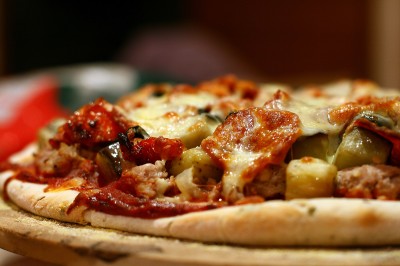
Image source: CBSNews
Let’s face it—it’s hard to stick to a diet.
We start a diet on Monday and plan to stick with it. That is, until Friday comes along and the kids want pizza for dinner. Eventually, we give in and eat 3 slices of extra cheese. After all, we deserve it. But the next day, our spouse surprises us with our favorite doughnuts. And we can’t resist the lure of doughnuts and coffee on Saturday morning, so we eat one.
But after a weekend of indulging in pizza and doughnuts, our grilled chicken salads seem, well, unappetizing. So we give up the diet that we were so passionate about on Monday and continue to binge on junk food.
Sound familiar? It should, as more and more Americans struggle with their weight. In fact, according to the Centers for Disease Control And Prevention (CDC), more than one-third (or 78.6 million) adults in the US are obese.
But scientists have recently discovered what dieters have known all along—that eating junk food spoils your appetite for healthy food.
A new study published in Frontiers in Psychology shows how junk food rewires our brains so that we don’t want to eat healthy food. Scientists in Australia conducted tests to see how junk food would affect the weight and dietary preferences of rats.
New All-Natural Capsule Protects You From Dangerous Toxins And Pollutants!
Not surprisingly, the researchers at the University of North South Wales found that eating junk food made rats at least 10 percent heavier than rats that ate a healthy diet. But more importantly, they also discovered that feeding junk food to rats discouraged them from eating healthy foods.
“Eating junk food seems to change the response to signals that are associated with food reward,” Professor Margaret Morris, co-author of the study and head of pharmacology from the UNSW Australia’s School of Medical Sciences, told Newsweek.
How did they conduct the study?
They performed several tests on two groups of rats. The first group of rats ate healthy food; however, the second group ate a junk-food diet of unhealthy foods such as dumplings, pies, cookies and cake. And both groups were also given grape- and cherry-flavored sugar water to drink.
 In one experiment, the researchers taught the rats to associate the sugar water with different sound cues. The rats that ate the healthier food responded appropriately to the sound cues. If they had just consumed sugar water and then heard another cue for sugar water, they didn’t drink more of it. But the rats that ate junk food, on the other hand, would respond to sound cues by drinking too much of the sugar water.
In one experiment, the researchers taught the rats to associate the sugar water with different sound cues. The rats that ate the healthier food responded appropriately to the sound cues. If they had just consumed sugar water and then heard another cue for sugar water, they didn’t drink more of it. But the rats that ate junk food, on the other hand, would respond to sound cues by drinking too much of the sugar water.
In other words, the junk-food rats drank too much of the sugar water, whereas the healthy-food rats stopped when they’d had enough.
“We know a lot about food and nutrition and what we should be doing, and yet we’re getting fatter and fatter,” Morris said. “Our sort of diet appears to override an animal’s ability to know it’s just eaten something — they’re just eating indiscriminately, if you will.”
In another experiment, the scientists wanted to see what would happen if the junk-food rats were placed on a healthy diet. But even after a week of eating healthy food, the former junk-food rats still acted the same way by overeating.
“It suggests that whatever changes happen in the brain may persist for a while,” she said.
Chia Seeds: Used By Top Survivalists For Mission-Critical Strength And Endurance!
Does this study on rats have any implications for humans? Unfortunately, yes.
Health experts have been warning us for decades about the dangers of consuming processed foods like cakes, doughnuts and cookies. But as every dieter can tell you, once you start eating junk food, it’s hard to go back to eating healthy.
And eating junk food usually doesn’t satisfy. In fact, eating junk food just makes you hungrier. Dr. Joel Fuhrman, the author of Eat to Live, describes this hunger as “toxic hunger.”
“I propose that these sensations are actually symptoms of detoxification and withdrawal from an unhealthy diet, lacking in crucial micronutrients. I call this toxic hunger,” Fuhrman explained on his website, DrFuhrman.com.
Is there hope for those addicted to junk food? Yes.
Fuhrman said, “Scientists now know that unhealthy food has effects on the brain similar to those of addictive drugs. Healthy food does not produce withdrawal symptoms — when the body is given vegetables, fruits, beans, nuts and seeds, there is nothing to detoxify.”
Junk food rewires your brain so that you don’t want to eat healthy foods. While there’s nothing wrong with having a piece of cake on your birthday or a slice of pumpkin pie on Thanksgiving, we all should try to limit the amount of junk food we eat.
It may take some time, but as you eat healthier foods, you will begin to crave more of these foods. And don’t look at it as a diet; make it a whole new lifestyle.
Do you agree that eating junk food takes away your desire to eat healthy food? Why or why not? Write your response in the section below:
 Off The Grid News Better Ideas For Off The Grid Living
Off The Grid News Better Ideas For Off The Grid Living




